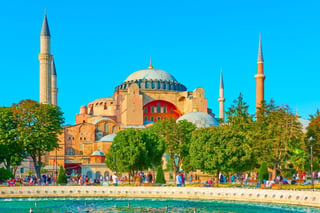Turkey has implemented a tourist fee specifically for visitors to Hagia Sophia

Foreign tourists visiting Hagia Sophia in Turkey must now pay an entry fee, a change from the previous arrangement in 2020 when it was converted into a mosque. The iconic site, initially a Byzantine cathedral, has introduced new regulations limiting tourist access to the gallery floor and establishing separate entrances for worshippers and visitors.
Streamlining Visitor Flows to Respect Spirituality
The mosque's approach to managing visitor flow introduces a fascinating case study, seeking to balance tourism accessibility with respect for its spiritual significance. Let's delve deeper into the implications:
Positives:
- Reduced noise pollution: Audio headsets ensure minimal disruption to prayer and contemplation, fostering a serene atmosphere for worshippers.
- Accessibility: Multilingual translations through the app make the experience inclusive for diverse visitors, promoting cultural understanding.
- Enhanced safety: Improved security infrastructure provides peace of mind for visitors and the mosque.
- Potential cost savings: The headset system is more cost-effective than employing multiple guides for different languages.
Negatives:
- Loss of personal touch: Pre-recorded information needs to have the nuance and flexibility of live guiding, potentially diminishing the richness of the experience.
- Technology dependence: Visitors reliant on the app might encounter technical difficulties or limited battery life, hindering their experience.
- Accessibility concerns: Not everyone may be comfortable using the headsets, potentially excluding some demographics.
Prioritising Devotees' Needs Amidst Tourism Deluge
While monetising sightseers, Muslim faithful retain free entry for worship during designated prayer times, upholding accessibility. The latest measures edge Hagia Sophia further toward its origins as a functioning mosque after serving as a museum since 1935.
However, given its architectural significance, its reclassification in 2020 as a mosque rather than a secular monument sparked international controversy. Critics argue the shift excessively favours serving Turkey's Muslim majority over preserving universal heritage.
Proponents counter that prayer must take precedence if the site operates as a mosque while controlled tourism still enables global sharing of its beauty. By charging foreign visitors, the complex strikes a pragmatic balance between financing upkeep and enabling adherence.
FAQS
What is the new entry policy for tourists at Hagia Sophia?
Hagia Sophia now requires all foreign tourists to purchase an electronic ticket for entry, priced based on the high/low seasons. Turkish citizens enter for free.
When does the new ticket policy take effect?
The paid entry policy for foreign tourists visiting Hagia Sophia takes effect from February 1, 2023.
Do worshippers also have to purchase tickets?
Muslim worshippers can still enter Hagia Sophia for free during prayer times. Only foreign sightseers are subject to the new ticket fees.
What are the hours open to tourists with tickets?
Hagia Sophia is open to pre-ticketed tourists daily from 9 am-4 pm, besides closures during Friday prayers and Ramadan. Tourist entry is prohibited during prayer times.
What does the ticket revenue go towards?
Income from Hagia Sophia's tickets helps fund operating costs and continued preservation efforts, ensuring a balance between tourism and its role as a functioning mosque.
